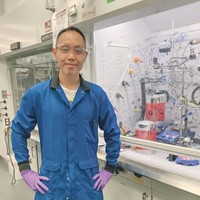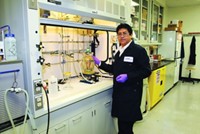Advertisement
Grab your lab coat. Let's get started
Welcome!
Welcome!
Create an account below to get 6 C&EN articles per month, receive newsletters and more - all free.
It seems this is your first time logging in online. Please enter the following information to continue.
As an ACS member you automatically get access to this site. All we need is few more details to create your reading experience.
Not you? Sign in with a different account.
Not you? Sign in with a different account.
ERROR 1
ERROR 1
ERROR 2
ERROR 2
ERROR 2
ERROR 2
ERROR 2
Password and Confirm password must match.
If you have an ACS member number, please enter it here so we can link this account to your membership. (optional)
ERROR 2
ACS values your privacy. By submitting your information, you are gaining access to C&EN and subscribing to our weekly newsletter. We use the information you provide to make your reading experience better, and we will never sell your data to third party members.
Pharmaceuticals
Ken Does The 1-2-3 Step
by Ivan Amato
November 2, 2009
| A version of this story appeared in
Volume 87, Issue 44
COVER STORY
Ken Does The 1-2-3 Step
It’s been a wild employment ride for Kenneth J. Barr over the past two years. The adventure began when the present recession did, at the end of 2007. Until then, Barr’s professional life as a chemist had followed a conventional plan. After getting a Ph.D. and finishing a postdoc in a reputable academic laboratory, Barr had enough credibility in the fields of synthetic and organometallic chemistry to land in 1995 a potential job for life at a major pharmaceutical company, Abbott. He worked at that first job for five years before moving to California to the biopharmaceutical start-up Sunesis, which zeroes in on oncology drugs for both solid tumors and blood cancers.
“We were successful,” Barr says, but even before the economic downturn, the company began morphing its strategic approach by shifting much of its research over to the company’s development partners, Barr notes. “I was part of the letting go of the research division,” he says. That was in September 2007.
He landed on his feet by getting a job a few months later at a brand-new company, Amplyx Pharmaceutical, whose mission is to develop anti-HIV, antibiotics, and other drugs that avert quick in-body degradation by getting sequestered in the protective environment inside cells. Barr was Amplyx’s third of three employees, and the company was entirely virtual, operating by way of outsourcing, collaborations, and consultants. “I worked out of my house in San Francisco,” Barr says. The chief executive officer was in Boston, and the chief scientific officer was in San Diego. “I knew from the start that Amplyx was risky, but it was experience worth getting,” he says.
Barr had been with Amplyx for about a year when it became clear that securing backing from venture capitalists was going to get tougher. The situation got harrowing enough that early this year he felt he needed to find a more secure situation.
“Looking for a job is a full-time job,” he notes. “You have to wake up in the morning and act as though this is what you are doing for a living.” He says he actually got lucky. It took him only about two months to find a new job.
Like many professionals looking for jobs, he found his by way of LinkedIn, the social networking site that caters to professionals, both working ones and ones looking for work. He learned through his LinkedIn network that Merck was enacting a strategy to supplement its internal research efforts with research done externally. He pursued this lead successfully, and in April, he began working at Merck as a project leader in a position that combines his skills in medicinal chemistry with his experience in working on projects with partners that are physically located in several places. It was great to get the job, he says, but it required a big change, too. Barr had to move across the country to Merck Research Laboratories in Boston.
That flexibility is necessary for job seekers these days, he says. For the past decade, Barr has been a career consultant with the American Chemical Society’s Department of Career Management & Development. “I have seen a large uptick in people who are midcareer and looking for jobs,” he says. He was one of them. “Many were expecting to never need to look for a new job,” he says, and as a result, they had not maintained significant professional networks external to their companies. A lot of his consulting work these days is a mix of helping job seekers manage the emotional hit that sudden unemployment delivers and helping them redefine themselves and retool for the new employment context.
“The very first thing I tell clients is to sign up for LinkedIn, after preparing a good résumé,” Barr says. “And as negative as it sounds, I tell people they need to be able to pursue alternative careers, to move to another country, or to leave the chemical industry into alternative fields where they still can apply their background in science.” Job seekers in two-career households, he adds, have to contemplate living apart, a compromise that he himself had to make.
The job situation for chemists, especially those interested in working for smaller, innovative companies, will remain rough for some time, Barr predicts. “Companies are still struggling, and it will be awhile before investors are willing to take chances,” he says. And because so many talented researchers have lost their jobs, he notes, more are competing for fewer slots.






Join the conversation
Contact the reporter
Submit a Letter to the Editor for publication
Engage with us on Twitter